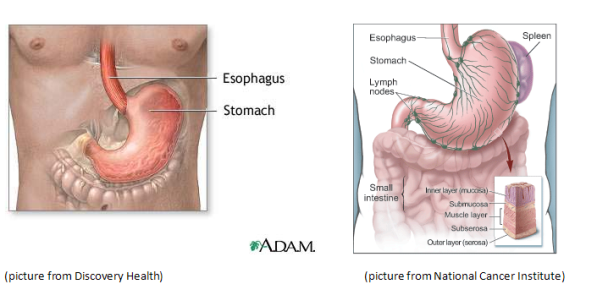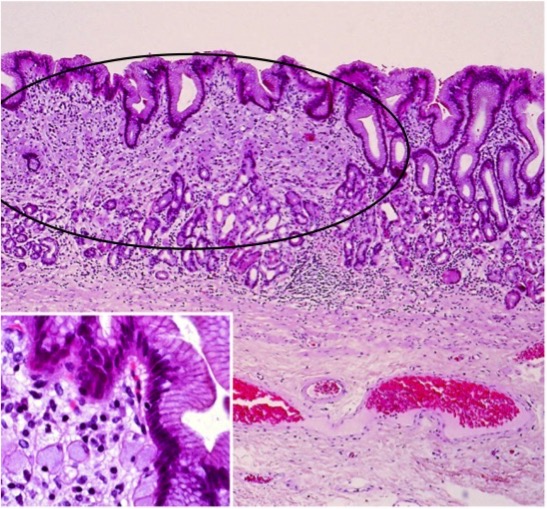Stomach (gastric) cancer, as defined by the National Cancer Institute (NCI), is cancer that forms in tissues lining the stomach. Located in the upper abdomen between the esophagus and small intestine, the stomach serves as a reservoir where food is stored and partially digested after it is eaten. When food enters the stomach from the esophagus, the stomach churns the food and releases digestive juices to process the food before it enters the small intestine.

Stomach cancer occurs when cells in the stomach become abnormal and multiply. The majority (90-95%) of stomach cancers are adenocarcinomas, meaning that they arise from the mucosal tissue lining the inside of the stomach. The abnormal cells may spread over time to invade more in-depth into the stomach wall or eventually spread to nearby tissues or organs. Adenocarcinomas of the stomach can be further classified as an intestinal-type or diffuse type, based on how the cells look under a microscope.
Usually, stomach cancer grows slowly throughout several years causing few, if any symptoms.
What proportion of stomach cancer cases are hereditary?
Up to 10% of stomach cancer cases are “familial” in origin, meaning that in about 1 in 10 cases, other family members are affected or have an increased risk. Read more about hereditary forms of stomach cancer at the National Institutes of Health Genetic and Rare Diseases Information Center (GARD).
What do doctors, hospitals, organizations, and researchers say about stomach cancer?
- Johns Hopkins Health Library
- Mayo Clinic
- City of Hope
- MD Anderson
- WebMD
- American Cancer Society
- Cancer Treatment Centers of America
- National Cancer Institute
- American Academy of Family Physicians
- Wikipedia
See statistics on Stomach Cancer
It is essential to know what type of stomach cancer you have. Hereditary Diffuse Gastric Cancer (HDGC) is an inherited cancer syndrome that leads to an increased risk for both diffuse gastric cancer and lobular breast cancer. Know your risk.
Three Types of Stomach Cancer (Adenocarcinoma)
Noncardia (Distal) Stomach Cancer
This type of stomach cancer may develop from long periods of inflammation and irritation in the lower portion of the stomach. It is associated with chronic infection of Helicobacter pylori (H. pylori) bacteria infection and is more common in developing countries. Behavioral and environmental factors including tobacco use, alcohol consumption, obesity, a diet rich in smoked, salted and pickled foods, and environmental exposure to dust and fumes are risk factors for this type of stomach cancer.
Treatment of H. pylori infection can decrease the risk of stomach cancer development. Tests used to detect H. pylori infection are blood antibody, urea breath test, stool antigen, and stomach biopsy.
Proximal Stomach Cancer
This type of stomach cancer starts in the upper part of the stomach and may extend into the gastroesophageal junction, which is the point where the esophagus joins the stomach. This cancer tends to occur in people who are obese or have gastroesophageal reflux disease. It is more common in the United States than in other parts of the world.
Diffuse Stomach Cancer

Diffuse gastric cancer is aggressive cancer that grows rapidly in the cells of the stomach wall. Unlink other cancers that form a mass or a tumor; these cancer cells are diffused – spread or scattered widely or thinly – making it difficult to diagnose. It tends to affect younger people with a family history of the disease or those having a genetic syndrome.
Hereditary Diffuse Gastric Cancer (HDGC) is a hereditary cancer syndrome sometimes caused by a mutation in the CDH1 gene. Learn more about HDGC In Families to determine if your family is at risk.
References and Resources for Hereditary Diffuse Gastric Cancer:
National Cancer Institute patient resources for HDGC
A pathologist can determine whether the cancer is the diffuse type. Some words that might be used by the pathologist include “signet ring carcinoma,” “diffusely infiltrating,” “poorly differentiated,” or “mixed or isolated cell types.”
“Linitis plastica” is a type of diffuse gastric cancer sometimes referred to as Brinton’s disease or leather bottle stomach.
References and Resources for Linitis plastica:
Science Direct
US National Library of Medicine
Cancer Research UK
Wikipedia
HER2 Testing and Clinical Decision Making in Gastroesophageal Adenocarcinoma
American Society of Clinical Oncology (ASCO). Published online November 14, 2016. DOI: 10.1200/JCO.2016.69.4836
Less common (rare) types of stomach cancers
Gastrointestinal stromal tumors (GIST)
These rare tumors start in stomach muscle or connective tissue and may be cancerous or non-cancerous. GISTs are typically found in the stomach although they can be found anywhere in the digestive tract.
National Cancer Institute information on GIST
National Library of Medicine information on GIST
Carcinoid tumors
Carcinoid tumors start in the stomach’s hormone-producing cells of the stomach. Most of these tumors do not spread to other organs.
Lymphoma
Lymphoma starts in the stomach’s immune cells.
Liposarcoma
Cancer that arises in fat cells and deep soft tissue.
Other stomach cancers
Other cancer types, such as squamous cell carcinoma, small cell carcinoma, and leiomyosarcoma (a muscle cancer) can also start in the stomach. These cancers are very rare.